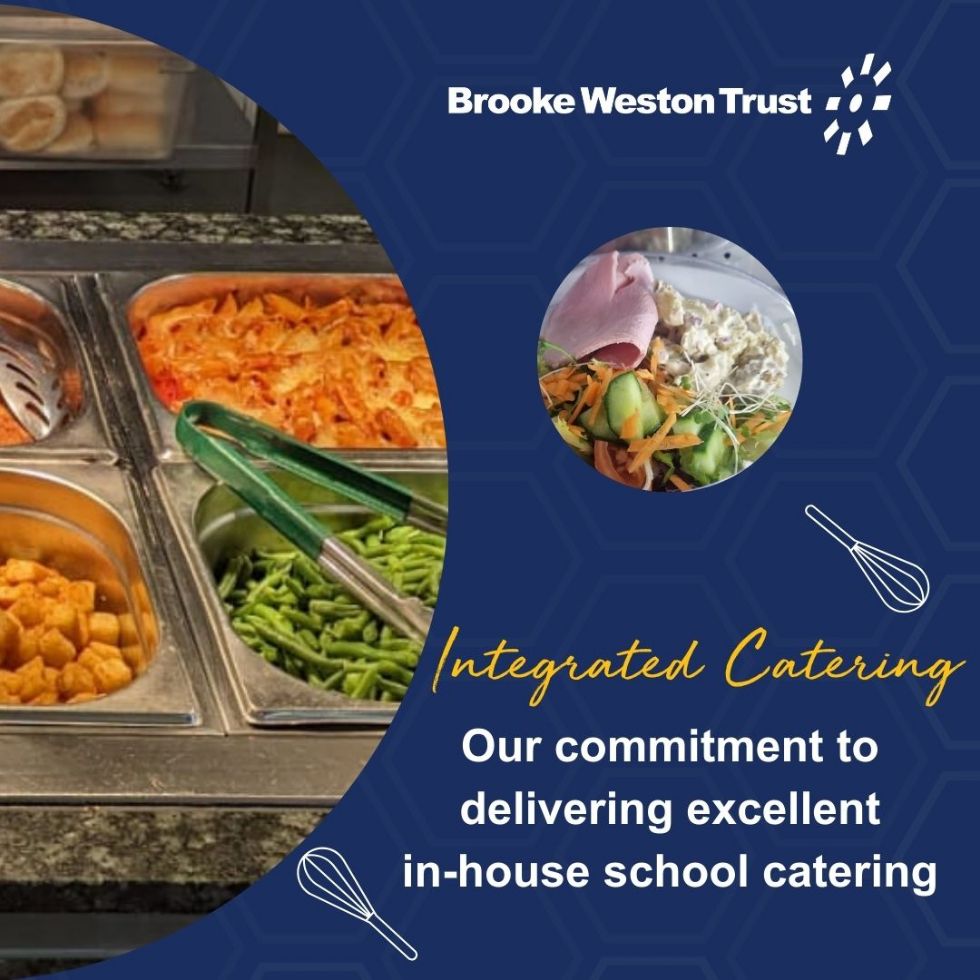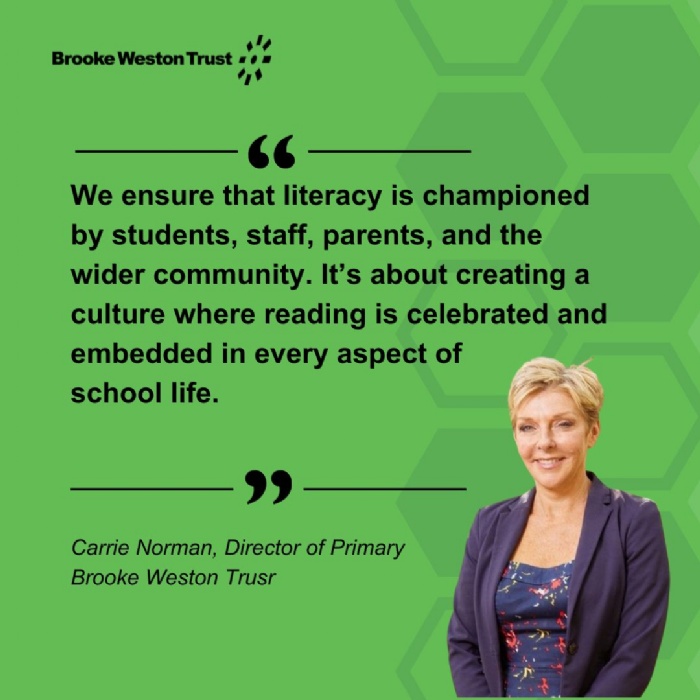Public Sector Catering magazine interview with Theresa Jackson, Head of Catering at the BWT

Theresa Jackson joined the Trust as Head of Catering in 2022, bringing with her over two decades of senior catering leadership experience. Theresa was recently interviewed by the widely respected 'Public Sector Catering' Magazine – where she shared not only her insights and expertise, but also the innovative approaches she brings to our catering offering. Read the full interview here:
Can you briefly outline how the catering service works across the Trust?
Theresa Jackson: We have 11 schools, five secondaries and six primaries and the catering is all 'in-house'. It’s great because we are purely focused on providing home-cooked, varied, nutritionally balanced and delicious food rather than maximising profit as an external provider would.
We still have to manage our budget carefully, enabling us to invest in new equipment, training and benefitting from the economies of scale possible by buying across all 11 schools.
As part of our commitment to our wider communities that we serve we engage with our local suppliers for the fresh food ; cooking from scratch including main dishes and our puddings. For some of our students this might be the only hot meal of the day and we are determined to ensure it is the best that we can possibly provide – we take great pride in ensuring this remains the case.
We also access the creativity and innovation of our amazing team members; running theme events throughout the year, such as Chinese New Year, Diwali and Eid, as well as others such as Cultural Week – tasting dishes, taking a tour around Europe. This is all done in partnership with our colleagues, staff and parents. Our students are also encouraged to provide feedback and themed events always go down really well.
We work tirelessly to maintain the five-star ratings we have from Environmental Health for all our restaurants, and we ensure our highly valued staff access our catering career pathways – from catering apprentice and assistant up to catering manager and beyond; promoting from within wherever I can. We look at our staff as an agile resourcing model across the Trust providing opportunities to work in different schools, large and small – secondaries and primaries and therefore most often we only need to recruit catering assistants externally. Brooke Weston Trust offers every employee a minimum of five training & development days a year – that’s caterers, administrators, site managers - everyone.
Our main supplier for stock items Brakes, for example, provides a development day as part of our contract arrangements and we access that for one of the 5 training days.
Each of our schools has a kitchen, though three have only small ones so they receive prepped ingredients to create the meals and cook them; sometimes pies, for example, are made at our other kitchens and cooked in the small kitchen on site.
Our chefs get joints from the butcher and cook fresh on roast dinner days, a little known fact is that we peel and roast all our own potatoes!
Our managers meet monthly, we have a Teams call every Friday to catch up; supporting one another and creating a feeling of team belonging a and 'catering community' across our different locations. We use our Whats App group to share pictures of what we’re doing and the food we’re cooking and these go out on social media – showing our parents and the wider community what we do and what the young people in our care are able to access.
Can you give us a few figures that give a snapshot of the catering operation?
TJ: We have a team of 90 catering staff across 11 schools, serving 6,670 meals, plus more than 1,000 meals to our staff daily.
Our secondary schools serve between 800 to 1,000 young people every day.
Are menus standardised across the portfolio? How much fresh food is used?
TJ: We change menus twice a year in October and again at Easter, and use local, seasonal produce as much as possible. There are core menus for primaries and secondaries, with schools able to reflect their own student preferences/requirements, so there are always some minor tweaks for each school. At the moment, we’re starting the Easter menu development process - involving all the head chefs, the managers and student councils. We look for locally sourced fresh produce from the butcher and bakery as well as fruit and vegetables; we don’t simply want the cheapest, we are looking for the best value, in line with our own values. We’re very strict on labelling and put the nutritional value on the sandwiches we now make in-house, even though that is not a legal requirement.
Tell us about your approach to staff training and development.
TJ: Recruitment can be a challenge, though not so much at the catering assistant level. Our staff have great benefits - flexible hours, wellbeing days, EAP (Employee Assistance Programme) support, any counselling they need, a generous sick pay scheme, a personal development plan for each staff member.
We now have more apprentices for positions, from commis chef up to manager level. And another idea we’re looking at is appealing directly to sixth formers at our schools who might relish a career in catering
We keep an ongoing dialogue with staff members about their wellbeing.
How has the service developed over the last five or so years?
TJ: When I arrived two years ago we were buying in sandwiches, using a mix of ready meals, and serving packaged goods like doughnuts alongside some home-baked items. I instigated making in-house sandwiches again, building our own range, moving into wraps and baguettes as well. You can’t beat your own sandwich, so that’s what we’ve done and that’s gone down well. The team was doing a good job, but Covid had pushed people into using boxed ingredients, so we’re moving out of that, back to fresh now, which also helps us get rid of some of the packaging. I am very well-supported by the Executive Board in our approach.
Has there been a strategic plan you’ve worked to?
Yes we have a three-year strategic plan and at the moment, we are very focused on sustainability; reducing our use of disposables, and will be 100% free by this Christmas in primaries.
We’re trying to eradicate them in secondaries as much as possible too. I’m looking at growth, too, and want to increase meal uptake across the board. Children don’t always take up their means-tested Free School Meals and UIFSM, so we’re looking to see how we can change that.
Our presentation of food which is attractive to the eye as well as presentation and how we serve it to our customers is equally as important.
Can you tell us how you develop your menus?
TJ: The menus reflect the time of year; stews and warming dishes in the colder months and then lighter dishes and salads in summer. We want to build and develop further the type of food the pupils are looking for. When we develop any new dishes, we get samples out to students to get feedback and get students excited about the menu change. The staff get a bit excited too!
When we launched Teriyaki chicken bao buns the reaction was amazing, so we very much keep an eye on trends. We have tried meat-free Mondays, for example, but received feedback from parents, so we stopped that idea but there are always lots of good veggie and vegan options each day, as well as gluten-free and dairy-free. For instance, we make two versions of our lasagne, so no one misses out.
Why did the Trust decide to introduce a breakfast service?
TJ: We were approached about trialling the idea and the Brooke Foundation, which supports the trust were very interested. We tried it at one primary school with a hot item or a cereal bar and the benefit was not only that pupils were having breakfast with their friends and it was a great start to the school day, but attendance also increased. Teachers said there was better attention in class, and one parent said it ‘changed her life’ - as she simply needed to get the children to school and not worry about feeding them first. The children get excited about breakfast and there is a real social aspect to the experience. We serve from 100 to 130 children a day – it’s available to everyone and there’s no need to book. It’s now gone into a second school and by Easter 2024, all six primaries will have the option. As an organisation, we have prioritised allocating funding to this initiative and our catering teams are very supportive and flexible enough to make it work. It’s so important – the great feedback and the impact shows it’s worth it.
The Trust also operates a holiday provision. How did that start?
TJ: Brakes started Meals & More, which is now a charity, and we applied to them for a grant, which is topped-up by us. We started last February at three primaries at 30 meals a day at £1 a head. We send the menu home with children nominated by the school – they know what our individual children and families need . The family then choose; We make a shepherd’s pie, for example, with reheating instructions. We served more than 3,000 meals over the last summer holidays, that is 120 children a day over six weeks. To prepare the meals we get the secondary school teams involved in helping to cook and prepare the meals. In addition to the grant, we have some very supportive suppliers and some of them have been very helpful and understanding in donating ingredients.
Food price inflation has been a significant challenge for caterers over the last year. How has it been for you?
TJ: We raised meal prices in September by 10% after absorbing the soaring costs for our families last year, especially the more expensive ingredients. We try so hard to only pass on what we really have to, because we know that parents and households generally are struggling. I spoke to Brakes who helped us sort out some really good savings, and stay in regular contact with our butcher and fruit & veg supplier. It’s about getting the balance right, constantly looking at prices, but our portion sizes have stayed the same and I’d rather change the dish than change the portion size. Our meal prices are now £2.64 for primaries, or £3.19 in secondaries for a main, dessert and a drink, or £2.64 without a drink. You can, of course, also buy items individually so there is something for everyone. We benchmark regularly and work very hard to provide value.
Looking to the future, can you tell us about the plans and aspirations for Brooke Weston Trust catering?
TJ: I’d like to work further with the local community to run cooking workshops for parents, showing them how to cook a few basic meals and what can be done with a simple bag of ingredients. We’re also developing the idea of student work placements, and I’m building on that.
The future really is bright for our integrated catering – making a real and daily difference to our students – I am proud to be such an integral part of our education mission – we all are!








